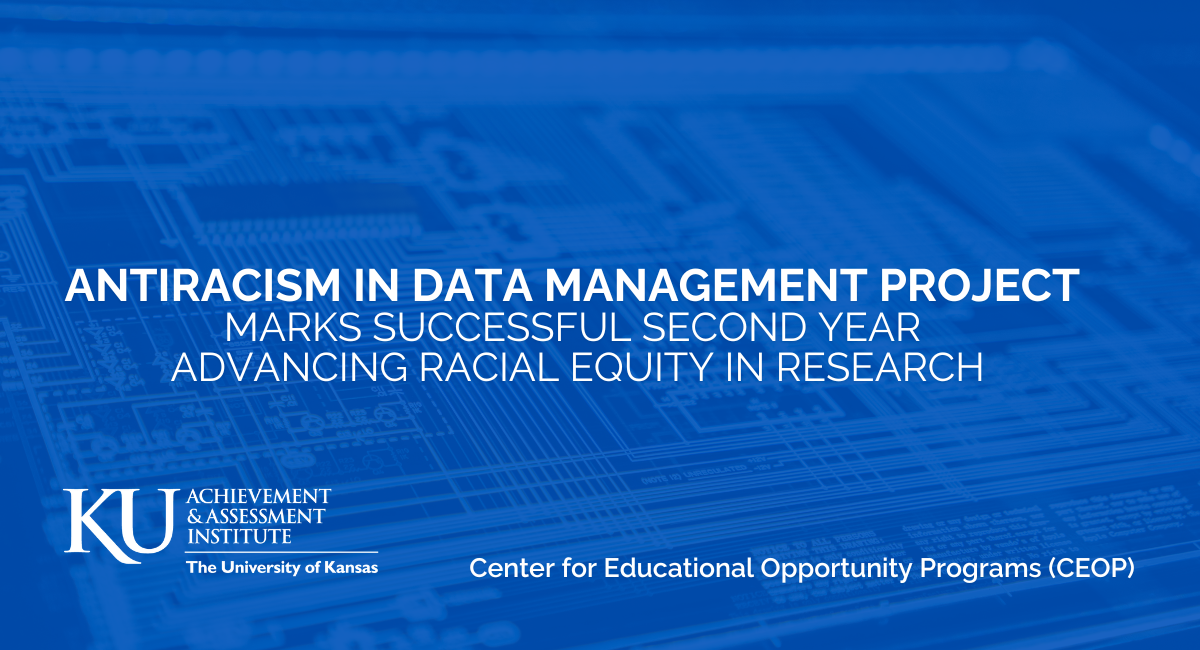Antiracism in Data Management Project Marks Successful Second Year Advancing Racial Equity in Research

The Antiracism in Data Management project, a project featuring virtual sessions that tackle antiracism practices for local and national research and evaluation communities, is wrapping up its second successful year with a final session in November.
Housed under the Achievement and Assessment Institute’s Center for Educational Opportunity Programs, the project was started in 2020 by a small group of CEOP staff members, including Lauren Coleman-Tempel, Director of the KU TRIO Training grant. The first iteration of the project began as the Antiracism Work Group in response to the murder of George Floyd in Minneapolis and the subsequent racial justice movements that followed. The work group involved CEOP staff coming together to read books and other media on antiracism and racial justice. As a center that works with underserved students, a large part of whom are students of color, CEOP staff wanted to become better educated in the issues affecting the communities they serve.
“I think white folks who work in programs that serve communities of color kind of took a step back and said, what can we do? There's more that we can be doing but what is our role? How do we try to fight for racial justice while not mimicking work that's done by communities of color who've been doing it for decades?” Coleman-Tempel said.
But as the group continued, Coleman-Tempel wanted to do something that had more of a direct impact in the work CEOP does. CEOP is home to programs such as Gear Up KCK, K-12 English Learners Training, TRIO Upward Bound, TRIO Talent Search, TRIO Educational Opportunity Centers, and TRIO Math and Science Center, all of which offer educational support and programing to underserved students in Kansas, including in Kansas City and Topeka. CEOP also conducts research on the programs they offer.
In order to better understand what the group could do to become more equitable and support antiracist work, the project hired a consultant from the KU Office of Multicultural Affairs who provided a strategic briefing and gave suggestions on how the group could move forward.
“We started to have conversations asking ourselves, ‘what impact are we actually making? Is this doing anything?’” Coleman-Temple said. “With my role being in and out of large social data sets and educational data sets, we decided to make a move and stay in our lane, which meant providing trainings to researchers who work with data to the end of racial equity.”
With the expanded scope of the project and funding from AAI, Rayven Smart, a graduate student in the educational psychology program, was able to join the project team as a graduate research assistant. A Kansas City native and a previous high school participant in the Gear Up Kansas City program, Smart has a close connection to the community and a passion for the project.
“When Lauren presented the idea to me, I was 100% in on this project. Being able to do something impactful in the data world for the community that I'm from was a no-brainer for me,” Smart said.
The project’s mission to take an antiracist stance in data management is important because when researchers’ biases creep into data collection and analysis, it can skew the results and further perpetuate harmful narratives. The project’s sessions feature experts in data management and racial equity that speak about ways researchers can combat these biases and how to more accurately quantify the humans they are researching. Examples of past speakers include Dr. Wendy Castillo, Associate Director of Philanthropic Research at The Bridgespan Group and lecturer at Princeton University, Tatewin Means and Dallas Nelson from the Thunder Valley Community Development Corporation, and Pieta Blakely of Blakely Consulting. Sessions have included topics such as quantitative critical theory, indigenous data sovereignty, and antiracism in data visualization.
“This project is definitely beneficial in starting to shift and change the conversations that we're having and how we're looking at things,” Smart said. “You may assume one thing but once you really take a deep dive into the data you discover that it's a completely different story and that story deserves to have light shed on it. I absolutely think that the work that we are doing is imperative to the community.”
Originally, the project was intended to be for AAI staff, as many AAI centers do research and utilize social data sets, but as more outside groups and researchers became interested in joining the sessions, the project opened up to others in the KU community and then beyond, even offering sessions for graduate students across the country. Coleman-Tempel said the project’s success is due in part to the support from AAI leadership.
“When the group came to me to present the idea for this project, I was sold on the idea,” AAI Director and University Distinguished Professor Neal Kingston said. “They’ve been doing some great work, and we’re not looking for boundaries. We’re looking to break through walls in regards to our commitment to equity.”
On top of support from AAI, the project recently entered a partnership with the KU Office of Research and received funds from the office. Coleman-Tempel and Smart will also be hosting a workshop for the Office of Research for recipients of the KU Racial Equity Awards on October 13th. With a presentation titled “Antiracist Practices in Research Design/Engagement.”
“We’re proud to partner with CEOP as they continue to develop and share with the KU research community best practices in antiracist data management,” said Mindie Paget, Assistant Vice Chancellor for Diversity, Equity, Inclusion & Belonging in the Office of Research. “Data is the foundation of research that shapes knowledge, helps us understand broader social issues, informs public policy, and drives decisions that can have profound impacts on people’s lives. That’s why it’s so important that researchers learn to recognize the biases they and others bring to their work — so they can design studies, interpret results, draw conclusions and make recommendations that don’t reinforce structural inequities.”
Antiracism in Data Management’s last session of the year will be held on November 16th and will feature Ezekiel Dixon-Román, professor of Critical Race, Media, & Educational Studies at Teachers College, Columbia University.

Looking ahead, Coleman-Tempel said that although the funding from KUOR was a good start, they are looking for additional funding to continue the project going and to keep Smart on as a GRA throughout her time at KU. The funds also allow the group to pay honoraria to the presenters.
“The message that I want everybody to hear is we're not the ones making the decisions about funding. We're seeking it, but the higher up the ladder you go, the more critical these decisions are.”